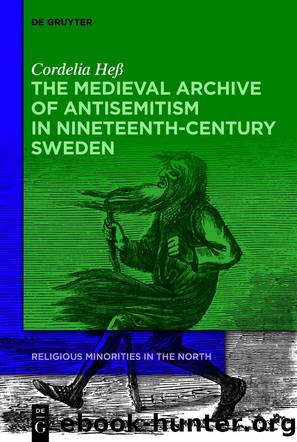The Medieval Archive of Antisemitism in Nineteenth-Century Sweden by Cordelia Heß

Author:Cordelia Heß [Heß, Cordelia]
Language: eng
Format: epub
Tags: History, Europe, Scandinavia, General, Jewish, Religion, Religious Intolerance; Persecution & Conflict, Social History, Social Science, Jewish Studies
ISBN: 9783110757408
Google: MWVUEAAAQBAJ
Publisher: De Gruyter
Published: 2021-12-20T02:49:33+00:00
5âBodies and gender: entertaining literature
A popular topic
Cultural, artistic, and literary text production about Jews increased throughout the nineteenth century, in line with the general increase in the number of books being printed. Jews appeared in various shapes and functions in literary, satirical, and educational texts, which did not exist independently from the distinctly anti-Jewish political, theological, and legal discourse which aimed at preventing Emancipation for most of the century. For most readers â and theatre audiences â the Jewish figures personified and staged something they usually did not know as real people but as an abstract threat discussed in newspaper articles, sermons, and books. Within this framework, even those texts which do not bear distinctly antisemitic features played a background role of âcreating a problemâ: Jews were much more present in writings than they ever were in real life, and a Swedish, mainly urban, public became used to seeing Jews as a distinctive group which was constantly being debated. On the theatre stage, Jews were usually people to laugh at.
Both Jewish and non-Jewish authors were present in the vast field of entertaining literature, most of the former translated from German. While a thorough investigation of the differences between Jewish and non-Jewish perspectives on, for example, the culture of Orthodox Jews in Galicia would be important for questions of style, self-representation, and the situation of Jews in the German lands and the Habsburg Empire, these differences were not particularly relevant in Sweden. It is doubtful whether Swedish readers knew that Leopold von Sacher-Masoch was Christian, while Karl-Emil Franzos was Jewish, when both described an East European Jewish culture which in Swedish newspaper articles had already been presented as utterly foreign, filthy, and outdated. The following short overview of literary texts with Jewish themes will show that regardless of the intention and origin of the authors, Jews were considered an interesting topic in nineteenth-century Sweden, and that most of the Jewish figures in operas, plays, and novels were portrayed stereotypically: angry and strict fathers, beautiful and silent daughters, greedy moneylenders, outwitted businessmen.
As early as 1801, a first edition of Richard Cumberlandâs play was published in a loose Swedish translation. Juden. Komedi i 5 akter was staged numerous times in the nineteenth century. The play had already been successful in England, where the text originated, and was equally popular in its Swedish translation; though mainly on the stage, as the first edition of the text was not followed by subsequent editions. In the German lands, one of the popular actors interpreting the main character in Cumberlandâs play was Albert Wurm. He also played the Jewish character Jacob in Karl Borromäus Sessaâs Unser Verkehr, a reaction against the Prussian Edict of Emancipation in 1812, in which Jews are portrayed as a collectivity incapable of change, driven by greed and selfishness, situated in the ghetto â which Sessaâs Jews are not able to leave, partly due to their inability to acculturate. The play led to a controversy in Berlin in 1815, when Israel Jakobsohn intervened
Download
This site does not store any files on its server. We only index and link to content provided by other sites. Please contact the content providers to delete copyright contents if any and email us, we'll remove relevant links or contents immediately.
Room 212 by Kate Stewart(5093)
The Crown by Robert Lacey(4793)
Endurance: Shackleton's Incredible Voyage by Alfred Lansing(4744)
The Iron Duke by The Iron Duke(4340)
The Rape of Nanking by Iris Chang(4191)
Joan of Arc by Mary Gordon(4082)
Killing England by Bill O'Reilly(3987)
Say Nothing by Patrick Radden Keefe(3966)
I'll Give You the Sun by Jandy Nelson(3421)
Shadow of Night by Deborah Harkness(3344)
Hitler's Monsters by Eric Kurlander(3321)
Mary, Queen of Scots, and the Murder of Lord Darnley by Alison Weir(3191)
Blood and Sand by Alex Von Tunzelmann(3181)
Eleanor & Park by Rainbow Rowell(3143)
Darkest Hour by Anthony McCarten(3113)
Margaret Thatcher: The Autobiography by Thatcher Margaret(3069)
Book of Life by Deborah Harkness(2914)
Red Famine: Stalin's War on Ukraine by Anne Applebaum(2912)
The One Memory of Flora Banks by Emily Barr(2850)
